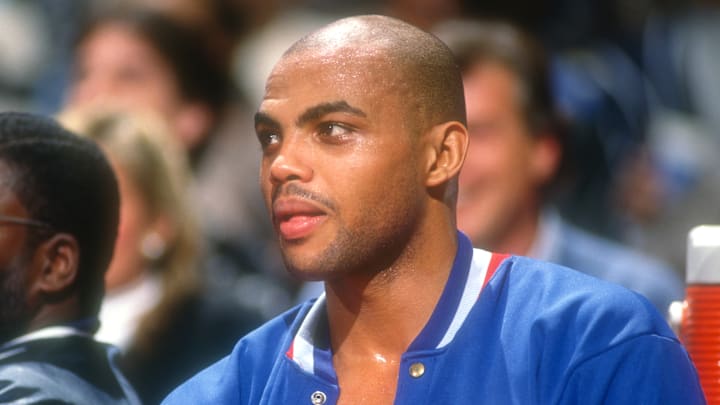Similar to most teams, the Philadelphia 76ers have made mistakes throughout the years.
Many still laugh at the 76ers selecting Markelle Fultz over Jayson Tatum in the 2017 NBA Draft, while others cringe at their acquisition of Andrew Bynum in 2012. However, Philadelphia made two of its most critical errors shortly after winning its most recent championship in 1983 and Charles Barkley holds a grudge that has lasted four decades.
Barkley appeared on Bill Simmons’ podcast “The Bill Simmons Podcast,” on Monday and they discussed various topics from the NBA to the Philadelphia Eagles. It took Barkley and Simmons less than 15 minutes to revisit his rocky 76ers tenure.
“I have been bitter and angry because [Philadelphia trading Moses Malone] cost me probably two championships because I was just becoming a star,” Barkley said.
Why the 76ers traded Malone
It was his sophomore campaign (1985-86) that catapulted Barkley into stardom, but also began the 76ers’ downfall. He and Malone finished top 10 in Most Valuable Player Voting as they led Philadelphia to a 54-28 finish, but only one would survive. Malone’s season ended shortly before the playoffs commenced because of a fractured right orbital bone.
The 76ers lost to the Milwaukee Bucks 4-3 in the Eastern Conference Semifinals. But, in the flames of defeat, Barkley cemented himself as the face of the franchise. He led Philadelphia in postseason scoring with 25 points per game on 61.9% true-shooting and 15.8 rebounds per game. This proved to be sufficient for Philadelphia’s brass to pivot into a new era.
The 76ers dealt Malone, Terry Catledge a 1986 first-round pick (Anthony Jones), and a 1988 first-round pick (Harvey Grant) to the Washington Bullets for Cliff Robinson and Jeff Ruland on June 16th, 1986. Philadelphia aimed to play faster and wanted to get ahead of the curve with Malone’s regression to clear the path for Barkley.
It did not go well…
The 76ers finished the 1986-67 campaign at 45-37, which was the first time they finished with below 50 wins in eight years. Barkley took full charge as he averaged a then-career-high of 23 points per game. Erving had a productive final season of his career, receiving all-star honors and Cheeks remained a stable two-way presence. Still, Philadelphia simply wasn’t as talented as it once was and fell to Milwaukee 3-2 in the Eastern Conference Quarterfinals.
Ruland played fewer than 70 games in his last two seasons with the Bullets. He fractured his right ankle during the 1984-85 campaign, then suffered a left knee injury the following year. Ruland participated in five contests for the 76ers before re-aggravating his left knee. He was forced to retire on June 12th, 1987.
Robinson spent three seasons in Philadelphia and proved to be a productive forward. He posted 16.8 points per game and six rebounds per game during his 76ers tenure. However, there was some positional overlap with Barkley at times.
Malone played in Washington for two years before signing with the Atlanta Hawks on August 16th, 1988. He was named an all-star for three straight years after being dealt by Philadelphia and remained a high-level center.
In hindsight, the 76ers jumped the gun too early and have tried to recover ever since.
It gets worse
Barkley failed to advance further than the second round in Philadelphia, but the blame was not his to endure. On the same day Malone was traded, the 76ers acquired Roy Hinson from the Cleveland Cavaliers in exchange for the first overall pick in the 1986 NBA Draft, which became Brad Daugherty. Philadelphia did this with a win-now lens and wasn’t fond of the fit with him and Barkley.
Daugherty finished his career as a five-time all-star and as a member of the All-NBA Third Team in the 1991-92 season. He was a critical part of the Cavaliers teams that challenged Michael Jordan and the Chicago Bulls early in his career. All the while, Hinson played one and a half seasons in Philadelphia.
“From that point on, I was so angry,” Barkley said. “Then I had to spend another four years just sucking in Philly.”
The 76ers failed to build a formidable team around Barkley, and the two moves they made on that fateful summer day were part of the reason why. Nonetheless, Barkley wasn’t flawless and there were other factors at play such as Andrew Toney’s career abruptly ending. But, it was mostly Philadelphia’s doing. Barkley was dealt to the Phoenix Suns on June 17th, 1992 and the 76ers received Jeff Hornacek, Andrew Lang, and Tim Perry in return.
Barkley and Philadelphia have remained ringless ever since.
